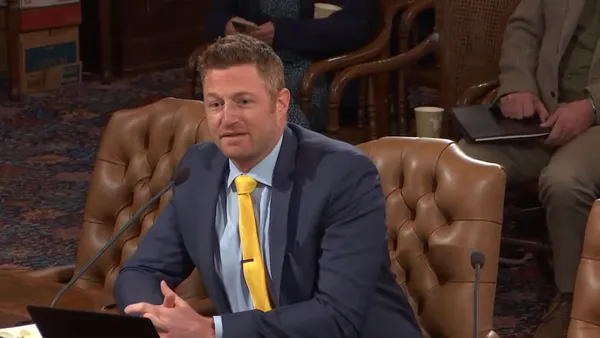Dive Brief:
- The U.K.'s Waste and Resources Action Program (WRAP) has published new date labeling standards that it estimates could help address one-third of all food waste if implemented, as reported by BBC News. The guidance was developed in collaboration with the U.K.'s Food Standards Agency and Department for Environment, Food and Rural Affairs.
- Two new logos — a blue refrigerator and a blue snowflake — are the consumer-facing centerpieces of this new guidance. The refrigerator is for items that should be stored at 5°C (41°F) and the snowflake is for items that should be stored in a freezer. WRAP estimates that setting appliances at the correct temperature, and storing food properly, could save £280 million ($377 million USD) per year.
- The standards also encourage manufacturers to include a "use by" date when indicating food safety and "best before" when indicating quality. "Display until" is not preferable. Only one date label per package is the preference, with a goal to help consumers maximize the shelf life of products they're purchasing.
Dive Insight:
WRAP, a non-profit established in 2000, is involved in accelerating "the move to a sustainable resource-efficient economy." Food waste has been a key part of that work for the past decade. This is driven by the U.N.'s Sustainable Development Goal of halving food waste by 2030 and a voluntary agreement to reduce per capita food waste in the U.K. 20% by 2025.
This newly published guide comes after a 2015 retailer survey found significant confusion about food labeling and storage. One of the more striking findings in that survey was 30% of people were keeping their refrigerators too warm. Initial changes made after that survey are estimated to have already helped avoid 150,000 metric tons of food waste.
Improper storage and date label confusion is also seen as a large cause of food waste in the U.S. Consumer awareness has grown in recent years following campaigns such as Save the Food and various industry-driven efforts. Two major trade groups have called for voluntary domestic standardization by 2018 and the Consumer Goods Forum recently called for worldwide standardization by 2020.
The Environmental Protection Agency has shared education about the topic, and the U.S. Department of Agriculture released guidance supporting "best if used by" last year. Though aside from some recent action in states such as California, legislative changes have yet to materialize. Without them, waste reduction advocates say that confusing labels can lead to excess purchasing and restrictions on donation. With interest growing in food recovery as a preferred solution over organics processing whenever possible, the momentum has increased and work is now happening to include some type of national language in the 2018 Farm Bill.















